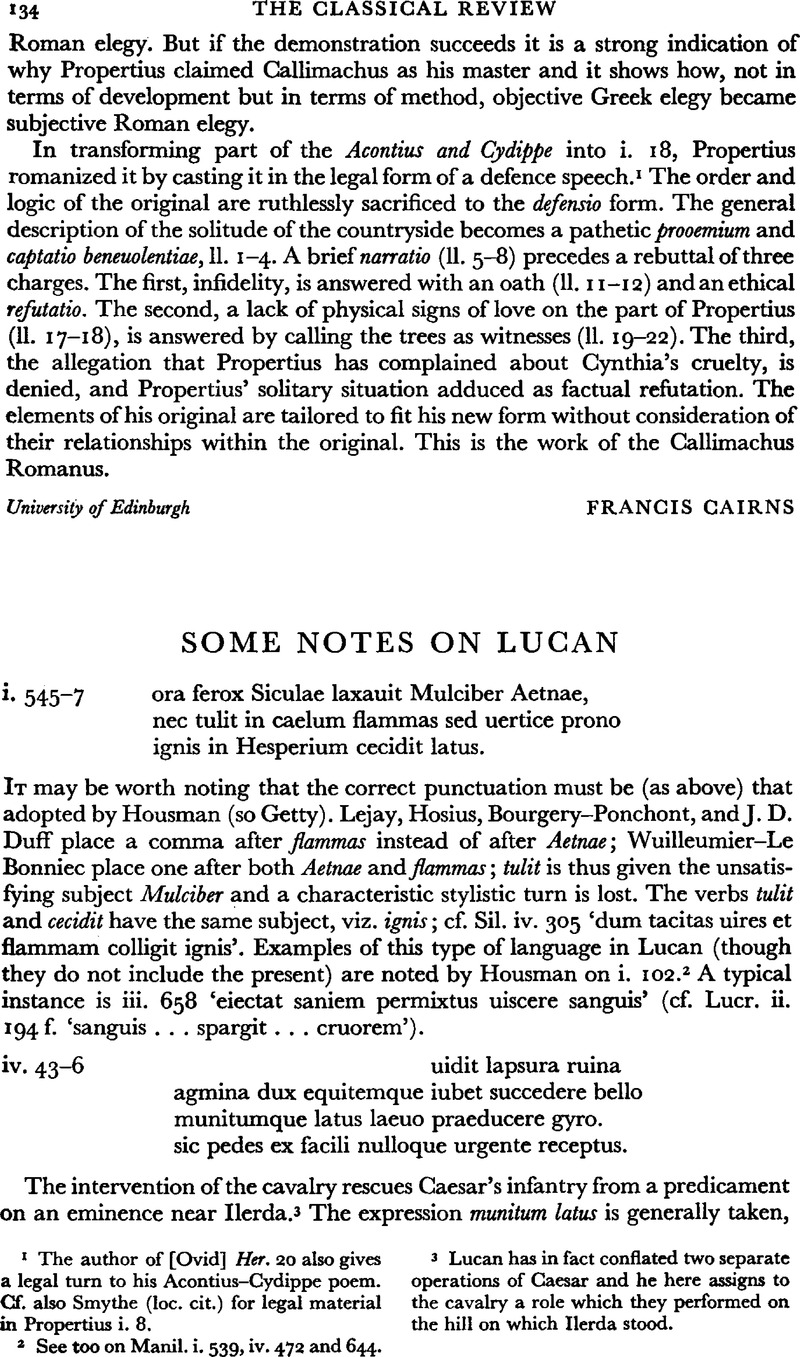No CrossRef data available.
Article contents
Some notes on Lugan
Published online by Cambridge University Press: 27 February 2009
Abstract

- Type
- Review Article
- Information
- Copyright
- Copyright © The Classical Association 1969
References
page 134 note 2 See too on Manil. i. 539, iv. 472 and 644.
page 134 note 3 Lucan has in fact conflated two separate operations of Caesar and he here assigns to the cavalry a role which they performed on the hill on which Ilerda stood.
page 135 note 1 Cf. ‘illud obponere latus quod clipeo tegebatur’.
page 135 note 2 I do not understand Bourg.-Ponchont's translation ‘faisant á gauche un mouvement circulaire, de former un rempart sur leurs flancs’.
page 135 note 3 B.C. i. 46. 3 ‘equitatus autem noster abutroque latere … summa in iugum uirtute conititur atque inter duas acies perequitans commodiorem ac tutiorem nostris receptum dat.’
page 135 note 4 Rather than ‘chased through deserted villages’ (Duff). The passage (88–93), as Francken indicates, has close affinities with Veil. ii. 19.4; and the words uacuis mapalibus actus and Velleius' ‘inopem … uitam in tugurio ruinarum Karthaginiensium tolerauit’ clearly have a common element. For examples of the dative with ago see T.L.L. s.v. 1377. 64 ff. (cf. Heitland, Introd. p. civ).
page 135 note 5 ‘Stray through deserted villages’ (Duff), Bourg.—Ponch. Wrongly translate ‘errer loin des douars déserts’.
page 136 note 1 He translates ‘A wound seen upon Caesar's self would not have delighted them more, by reason of a little blood.’ The words have no meaning.
page 136 note 2 Housman, (C.R. xliv [1930], 136)Google Scholar in cludes the lines among those he regards as wrongly taken by Bourg.-Ponch.
page 136 note 3 For the use of the prepositional phrase compare Liv. xxxiii. 33. 3 ‘cum robur iuuentae turn gaudium ex tam insigni gloriae fructu uires suppeditabat’, Sen. Benef. ii. 10.4 ‘respiciendum gaudium ex accipientis uoluntate’.
page 136 note 4 Discussed recently by Ollfors, A., Textkrit.u. interpret. Beitr. zu L., 14–16.Google Scholar
page 136 note 5 See too C.Q. xxvii (1933), 2 f. (on Stat. Theb. i. 535 f.).
page 136 note 6 He first served castrorum in plebe (144) and was promoted to the rank of centurion (146).
page 136 note 7 Otherwise vi. 157 non paruo sanguine (vii. 282 minima s.), iv. 239 paruus cruor. But there is no need to conjecture parui.
page 139 note 8 Similarly most editors, e.g., Oudendorp, Burman, Lemaire, Haskins, Bourg.-Ponch., and T.L.L.
page 137 note 1 Cf. 54 above; Lucan makes Ptolemy responsible.
page 137 note 2 Cf. B.C. iii. 108. 2 ‘(Pothinus) eundem Achillam … omnibus copiis praefecit.’ The language is similar, but in Lucan the action is ascribed to the king.
page 137 note 3 In taking qua as adverb, ira as nominative (with commas after non and debuit) Housman is merely being perverse (cf. Helm, , Lustrum i [1956], 167)Google Scholar. With (Caesar Pothinum) rapuit, which he finds mirum, we may compare Lucan's epitaph in Anth. Lot. 668. I ‘Corduba me genuit, rapuit Nero, proelia dixi’; cf. Caes. B.C. iii. 112. ‘(Pothinus) a Caesare est interfectus.’
page 137 note 4 Others too have expressed doubts about 518, e.g. Oudendorp; Bourgery would like to delete 517 as well.
page 137 note 5 In his Introduction, p. xxii, he observes that ‘manifest examples of verses interpolated in the several manuscripts are few.’ He gives one instance only (vi. 187) of a line attested (as here) by all the manuscripts which is generally rejected. His rejection of other lines as spurious has been questioned (cf. Helm, art. cit. 166 f.).
page 137 note 6 Favoured expressions, comparable with Ceruix caesa in 518, are ii. 150 ceruix caesa, ix. 214 ceruice recisa, ii. 172 cum qua ceruice recisum conueniat … caput, ii. 112 ab ignota uoltus ceruice recisos, etc.
page 137 note 7 A.J.P. lxxxvii (1966), 277.Google Scholar
page 137 note 8 He adds the further rebuke ‘In the later books Lucan is much too fond of ending his sentences with caput.’
page 138 note 1 The order for the murder was given by Ptolemy (cf. viii. 537).
page 138 note 2 It is this aspect of Pompey's end which attracted another declaimer, Juvenal: 10 285f. ‘igitur Fortuna ipisu er urbis | Seruatum uicto caput abstulit’
page 138 note 3 In both passages male (with participle) = uix (cf. vi. 177). Haskins assigns to the adverb in 518 the false sense of ‘wrongly’, ‘as it should not have been’ Cf. Viii. 673 ‘nondum artis erat caput ense rotare.’




